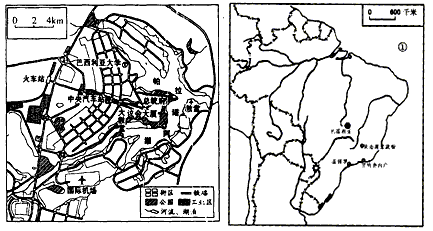阅读下面的材料,回答下列问题。
材料一:巴西利亚城市功能分区示意图和巴西主要城市分布图。

巴西于1958年开始建造新首都--巴西利亚。巴西利亚规划布局的基础是两条正交的轴线,由此形成的“十”字标志是它的象征。城市中横贯东西的主轴线,布局行政、公共建筑;另一条是贯通居住区的弓形纵轴线。两轴线相交处为商业、文化娱乐等公共建筑中心。铁路和高速公路从城市西侧经过,机场布置在城南,都有方便的城市干道相连接。居住区由系列统一而稍有变化的街坊所组成,并列布置在南北道的两侧。巴西利亚的规划,功能清楚,布局合理,接近自然,也便于组织居民生活,形成一个宜人的生活环境。巴西利亚也由此成为目前世界上唯一一座被列为世界文化遗产的现代新兴城市。
(1)巴西利亚的城市性质为______________________________________。
(2)巴西首都从里约热内卢迁往巴西利亚原因。
_________________________________________________________________________________________
_________________________________________________________________________________________
_________________________________________________________________________________________
(3)巴西利亚工业区选址的优点:
①___________________________________________________________________________________;
②___________________________________________________________________________________;
③___________________________________________________________________________________。
(4)巴西利亚功能分区的合理性体现在哪些方面?
_________________________________________________________________________________________
_________________________________________________________________________________________
_________________________________________________________________________________________
(1)政治中心
(2)地形平坦,海拔较高,气候凉爽;避免里约热内卢出现过度的城市化现象;开发巴西内陆,推动巴
西高原地区的发展。
(3)靠近铁路、高速公路,交通便利 位于巴西高原,地形平坦,气候温和,工业区处于东南信风的下
风向,对市区影响小。
(4)巴西利亚的各功能区功能清楚,布局力求完整连片;亲近自然,注意环境保护;各功能区之间联系
方便,且避免相互干扰;功能区的空间组合充分考虑城市景观和形象的需要,形成有特色的“十”字
形空间结构形态。
